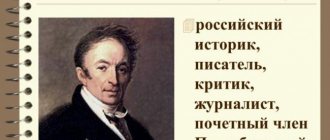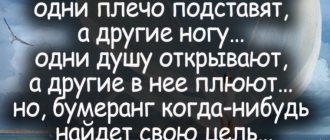Alexander Andreevich Chatsky is the central character of the comedy “Woe from Wit” in the verses of A. S. Griboyedov. The strong, freedom-loving, straightforward and progressively thinking protagonist does not fit into the usual framework of the capital's high society society, as a result of which he becomes an outcast. Chatsky’s characterization clearly demonstrates the presence of global social problems rooted in the Russian nobility in the first half of the 19th century. Chatsky confidently opens these abscesses, but none of the representatives of “Famus” society is ready to honestly face the truth.
a brief description of
Before reading this analysis, we recommend that you familiarize yourself with the work Woe from Wit itself.
Full name : Alexander Andreevich Chatsky.
Age not specified, young man.
Occupation - no specific type of activity, had an unsuccessful experience in the civil service.
The family is an orphan, father Andrei Ilyich Chatsky, mother Anna Alekseevna.
Social status : nobleman, landowner.
Origin - comes from a noble family, belongs to the highest metropolitan nobility.
Upbringing is traditional for noble families.
Education is traditional for noble families.
Appearance - not specified, young man of attractive appearance.
Character - independent, freedom-loving, honest, decisive, sarcastic, capable of bold actions.
Positive traits - truthful, incorruptible, sincere, strives for knowledge.
Negative traits - categorical, ruthless, arrogant, loving to openly ridicule the weaknesses and vices of other people.
The work is “Woe from Wit.”
Author : Alexander Sergeevich Griboyedov.
Speech characteristics of Chatsky
Alexander Andreevich Chatsky is a well-educated, sophisticated, well-read man. His speech fully reflects his essence: it sounds bright, figurative, harmonious, meaningful. The sentences are detailed, including complex phrases and an abundance of secondary members. This indicates the culture and depth of thinking of the hero.
Chatsky is a very emotional person, thanks to which his speech is colored by a variety of emotions and feelings: joyful excitement and tenderness at the sight of Sophia, contempt for the unchanged foundations of noble Moscow, firmness and devotion to his own life principles. The hero's speech is filled with exclamations, apt expressions, and high-style phrases that give his dialogues and monologues special brightness and expressiveness.
Chatsky freely and straightforwardly expresses his own thoughts about upbringing, education, service, duty and honor, which in many ways are a reflection of the author’s position. His speech is characterized by either monologues or short but very succinct remarks, many of which have become aphorisms: “And the smoke of the fatherland is sweet and pleasant to us,” “The tradition is fresh, but hard to believe,” “The houses are new, but the prejudices are old,” “Who are the judges?”
Starting with the letter I
And the rope will come in handy on the road
Quote from N.V. Gogol’s comedy “The Inspector General” (1836), no. 4, yavl.1 0, Osip’s words: “...everything will come in handy on the road... What’s there? rope? give me some rope! and the rope will come in handy on the road: the cart breaks off, or something else, you can tie it up.”
And the battle broke out, the Battle of Poltava
Quote from A. S. Pushkin’s poem “Poltava” canto 3 (1829). Quoted as a characteristic of a heated, noisy argument or quarrel.
And the smoke of the fatherland is sweet and pleasant to us
Quote from A. S. Griboedov’s comedy “Woe from Wit” (1824), no. 1, yavl. 7, words of Chatsky, who returned from his trip. Sarcastically remembering the old Muscovites, he says: I am destined to see them again! Will you get tired of living with them, and in whom you won’t find any stains? When you wander, you return home, And the smoke of the fatherland is sweet and pleasant to us.
Griboedov’s last verse is a not entirely accurate quote from G. R. Derzhavin’s poem “The Harp” (1798):
The good news about our side is dear to us: The Fatherland and the smoke are sweet and pleasant to us.
And live in a hurry and feel in a hurry
Quote from P. A. Vyazemsky’s poem “The First Snow” (1822). Put by A. S. Pushkin as an epigraph to the 1st chapter of “Eugene Onegin”.
And it’s boring, and sad, and there’s no one to give a hand to
Quote from the poem by M.Yu. Lermontov “Both boring and sad” (1840): And boring, and sad, and no one to give a hand to In a moment of spiritual adversity... Desires! What benefit is there to wish for in vain and forever? And the years pass - all the best years...
And again the battle! Rest only in our dreams
Quote from the poem by A. A. Blok “On the Kulikovo Field” (1909).
And you Brute?
In Shakespeare’s tragedy “Julius Caesar” (d.3, iv.1), with the following words (in the original Latin: “Et tu, Brute?”), the dying Caesar addresses Brutus, who was among the conspirators who attacked him in the Senate . Historians consider this phrase legendary. Marcus Junius Brutus, whom Caesar considered a supporter, became the leader of the conspiracy against him and was one of the participants in his assassination in 44 BC. Caesar, at the first wound inflicted on him, as Suetonius reports in his biography, only sighed and did not utter a single word. However, at the same time, Suetonius adds, they said that Caesar, seeing Brutus advancing on him, exclaimed in Greek: “And you, my child?” But according to Shakespeare's tragedy, Caesar's legendary phrase became a catchphrase to describe his friend's unexpected betrayal.
Ivan Nepomniachtchi
In Tsarist Russia, captured escaped convicts, hiding their past, hid their real first and last names, called themselves Ivans and said that they did not remember their relationship; the police recorded them as “not remembering their kinship,” hence their nickname “Ivan Nepomnyashchiy.”
Choose the lesser of two evils
An expression found in the works of the ancient Greek philosopher Aristotle “Nicomachean Ethics” in the form: “The lesser of evils must be chosen.” Cicero (in his essay “On Duties”) says: “One should not only choose the least of evils, but also extract from them themselves what can be good in them.”
Making an elephant out of a molehill
The expression used to mean “to greatly exaggerate something” is one of the ancient ones. It is quoted by the Greek writer Lucian (2nd century AD), who ends his satirical “Praise of the Fly” like this: “But I interrupt my word, although I could say a lot more, lest anyone think that I “, according to the proverb, I make a molehill out of a molehill.” (Lucian. Collected works: Translation edited by B. L. Bogaevsky. - M. L., 1935, p. 118)
Look for a woman (Cherchez la femme)
This expression is used (often in French: “Cherchez la femme”) when they want to say that a woman is the culprit of some event, disaster, or crime. It became famous thanks to the novel “The Mohicans of Paris” by Alexandre Dumas the Father (1802-1870), which he converted into a drama of the same name (1864). These words in “The Mohicans of Paris” (in the novel, part III, chapters 10 and 11, in the play, part 2, episode 16) are a favorite saying of a Parisian police official. Dumas used an expression that was actually used by the famous French police official Gabriel de Sartine (1729-1801)
Biography
Alexander Andreevich Chatsky is a young man, nobleman, landowner, son of Andrei Ilyich Chatsky. At an early age he remains an orphan, and Famusov, who was very friendly with his father, takes in the boy to raise him. Alexander spends some time in Famusov's house, being brought up with his daughter Sophia, with whom he falls in love with all the ardor of his youthful heart.
Unexpectedly for everyone, the matured Alexander leaves the Famusovs’ house and goes on a trip abroad. He has been absent for three years without giving any news of himself. He also unexpectedly returns to Moscow.
Chatsky hurries to Sophia, whose feelings for whom have not cooled down over the years of separation, but the 17-year-old girl greets him coldly: she is deeply offended by the fact that Chatsky did not write her a single line during his absence. Chatsky finds out that Sophia is in love with the obliging coward Molchalin, and such a choice both horrifies and offends his feelings.
Sophia, wanting to annoy the caustic and sharp-tongued Chatsky, starts a rumor about his madness. He is happily picked up by Famusov’s inner circle, who are unable to accept the progressive ideas of the brave young man. As a result, deeply disappointed Chatsky leaves Moscow forever.
Russian language, 9th grade
French books make her sleepless, But Russians make me sleepy... These words belong to Famusov, who is against everything foreign and believes that evil results from it. And in general, in his opinion, it is not necessary to read books. He thinks that there is nothing rational in them, only vice and fiction. In modern speech, this aphorism means that some people think that life is better and more correct in the West. But in reality, everything is not so simple, and in many ways it is a myth. You can use the statement in a situation where you need to pay attention to your own country, its resources, reserves, and capabilities. Girls' morning sleep is so subtle... These are the words of Lisa to Sophia's father. They say that girls are always emotional, so they don’t sleep soundly. In other words, it is very easy to wake them up. In modern speech it can be used when pointing out that a girl, for example, likes to get up early. Pass us by more than anyone else, both lordly anger and lordly love... These are the words of the prudent Lisa. She's absolutely right. Why get in the owner's eyes when he, as a rule, is a man of mood. Today you can use the aphorism in a similar situation, when it is better not to attract the attention of a person who is not in a good mood. Is it possible to choose a nook further away for walks?.. Famusov says this to Molchalin, who was rubbing himself near Sophia’s room. These are words of warning. And today you can tell someone who, for example, is making noise under your windows at night. My custom is this: Signed, off your shoulders. Famusov does not like to accumulate work; he believes that it is better to do everything at once, so he firmly adheres to his position and cannot stand the delays of others. Refers to timely completion of work. There is no need to put off until tomorrow what you can do today. Oh! If someone loves someone, Why search for intelligence and travel so far?.. This is Sophia talking about Chatsky. She is offended that, despite his love for her, he left her for three whole years. You can apply the aphorism to a situation where you shouldn’t leave love. It's barely light and you're already on your feet! And I'm at your feet. Blessed is he who believes, he is warm in the world!.. Chatsky speaks these words to Sophia upon arrival. Thus showing how he hurried to her, how he wanted to see her. Today, this aphorism can be used to emphasize that I came early and was not late. Winged expressions from the text of the comedy: “And all the Kuznetsky Bridge, and the eternal French, From there fashion comes to us, and authors, and muses: Destroyers of pockets and hearts! When will the creator deliver us from their hats! caps! and stilettos! and pins! And book and biscuit shops!” (Famusov, phenomenon 4) “You don’t need another example, When the example of your father is in your eyes.” (Famusov, phenomenon 4) “Blessed is he who believes, he is warm in the world!” (Chatsky, phenomenon 6) “Where is it better?” (Sofia) “Where we are not.” (Chatsky, phenomenon 6) “Will you get tired of living with them, and in whom you won’t find any stains? When you wander, you return home, And the smoke of the Fatherland is sweet and pleasant to us!” (Chatsky, phenomenon 6) “But by the way, he will reach the known degrees, After all, nowadays they love the dumb.” (Chatsky, phenomenon 6)
The image of Chatsky
Alexander Chatsky is a bright representative of the new, young generation of Russian aristocrats of the first half of the 19th century, who sincerely wanted to change their homeland for the better, to reform its rotten social foundations.
Being a true patriot, Chatsky strives to improve Russia from the inside, to teach citizens to treat their own history, culture, language with love and respect, and not to bow to everything Western.
Possessing an excellent oratorical gift and being a caustic and sarcastic person by nature, he gladly ridicules various vices of both individual people and Moscow society as a whole.
Chatsky sees the future in education, economic and social reforms, the rejection of such old-regime values as veneration, servility, and working not according to one’s vocation, but to advance one’s career.
Alexander Chatsky passionately calls for abandoning outdated traditional views, keeping up with the times, and developing, but his ideas are perceived by society as madness.
Conclusion
The comedy in verse by A. S. Griboyedov “Woe from Wit” was conceived by the author as an acutely social work in which the theme of the vices of society is revealed. Great importance is given to Alexander Chatsky, who became the personification of a thinking, progressive principle. The role of the hero is to demonstrate how rotten and hypocritical the “Famus” society is.
A detailed description of Chatsky will be especially useful when preparing for a literature lesson in 9th grade. With its help, you can independently prepare an oral description of the hero, a comparative description of Chatsky and other comedy characters, and prepare for a presentation or essay on a given topic.
The collected material, which includes quotes from the text, allows you to independently characterize the character according to plan, help you compose a detailed written work or write an essay on a given topic.
Aphorisms, quotes from “WOE FROM MIND” on actions and phenomena
Aphorisms, quotes from “WOE FROM MIND” on actions and phenomena
There are many catchphrases in the play that are spoken by different characters. They came into use, becoming aphorisms and often quoted in various life circumstances. They are given in order: action, phenomenon, who speaks, catchphrase.
Action 1, phenomenon 2
maid Lisa:
- Ah, far away from the masters; They prepare troubles for themselves at every hour, Pass us by more than all sorrows, And the lordly anger, and the lordly love.
Action 1, phenomenon 4
Sophia:
- Happy hours are not observed.
Famusov:
- I am afraid, sir, I am mortally afraid of one, so that many of them do not accumulate; If you had given it free rein, it would have settled; And with me, whatever it is, what it doesn’t matter, my custom is this: Signed, off your shoulders.
Act 1, phenomenon 7
Chatsky:
- However, he will reach the known levels, Because nowadays they love the dumb.
- Blessed is he who believes, he is warm in the world!
- I am destined to see them again! Will you get tired of living with them, and in whom you won’t find any stains? When you wander, you return home, And the smoke of the fatherland is sweet and pleasant to us.
- What is the tone here today? At conventions, at big ones, on parish holidays? A mixture of languages still prevails: French with Nizhny Novgorod?
- Sofia
Persecution of Moscow. What does it mean to see the light! Where is better?
Chatsky:
Where we are not.
Action 2, phenomenon 1
Famusov:
- Read not like a sexton, but with feeling, with sense, with order!
Action 1, phenomenon 10
Famusov:
- What a commission, creator, to be a father to an adult daughter!
Action 2, phenomenon 2
Chatsky:
- How to compare and see the present century and the past: The legend is fresh, but hard to believe.
- I would be glad to serve, but being served is sickening.
Action 2, phenomenon 5
Famusov:
- How do you begin to introduce yourself to a little cross, to a small town, Well, how can you not please your dear little one!..
- And whoever saw the daughters, hang your head!..
- They sing French romances to you And the upper notes are played out, They cling to the military people, But because they are patriots.
- To this, to that, and more often to nothing; They will argue, make some noise and... disperse.
Chatsky:
- Who are the judges? - For the antiquity of years, their enmity is irreconcilable towards a free life, Judgments are drawn from forgotten newspapers of the times of Ochakovsky and the conquest of the Crimea.
- And who in Moscow hasn’t had their mouths clamped at lunches, dinners and dances?
- The women shouted: hurray! And they threw caps into the air!
Act 2, scene 11
Molchalin:
- Ah, evil tongues are worse than a pistol
Action 3, phenomenon 1
Chatsky:
- I'm strange, but who isn't? The one who is like all fools; Molchalin, for example...
Action 3, phenomenon 3
Molchalin:
- At my age I should not dare to have my own judgment.
Chatsky:
- When in business, I hide from fun; When I'm fooling around, I'm fooling around; And there are a ton of experts in mixing these two crafts —I’m not one of them.
- Have mercy, you and I are not guys, Why are other people's opinions only sacred?
- I’m not a reader of nonsense, but more than exemplary ones
Act 3, scene 21
old woman Khlestova:
- Calendars all lie
Famusov:
- Well, it’s a great misfortune that a man drinks too much! Learning is a plague; learning is the reason.
Act 3, scene 22
Chatsky:
- Despite reason, despite the elements
Action 4, phenomenon 4
Chatsky:
- Listen, lie, but know when to stop!
Act 4, phenomenon 10
Chatsky:
- Fools believed it, passed it on to others, Old women instantly sounded the alarm - And here is public opinion!
Act 4, scene 14
Famusov:
- Bah! all familiar faces
- You shouldn’t be in Moscow, you shouldn’t live with people; I gave her away from these grips. To the village, to your aunt, to the wilderness, to Saratov, There you will grieve, sit at the hoop, yawn at the calendar.
Chatsky:
- Get out of Moscow! I don't go here anymore! I’m running, I won’t look back, I’ll go searching around the world, Where there is a corner for an offended feeling! Carriage for me! Carriage!
Act 4, scene 15
Famusov:
- Oh my god! What will Princess Marya Aleksevna say?







